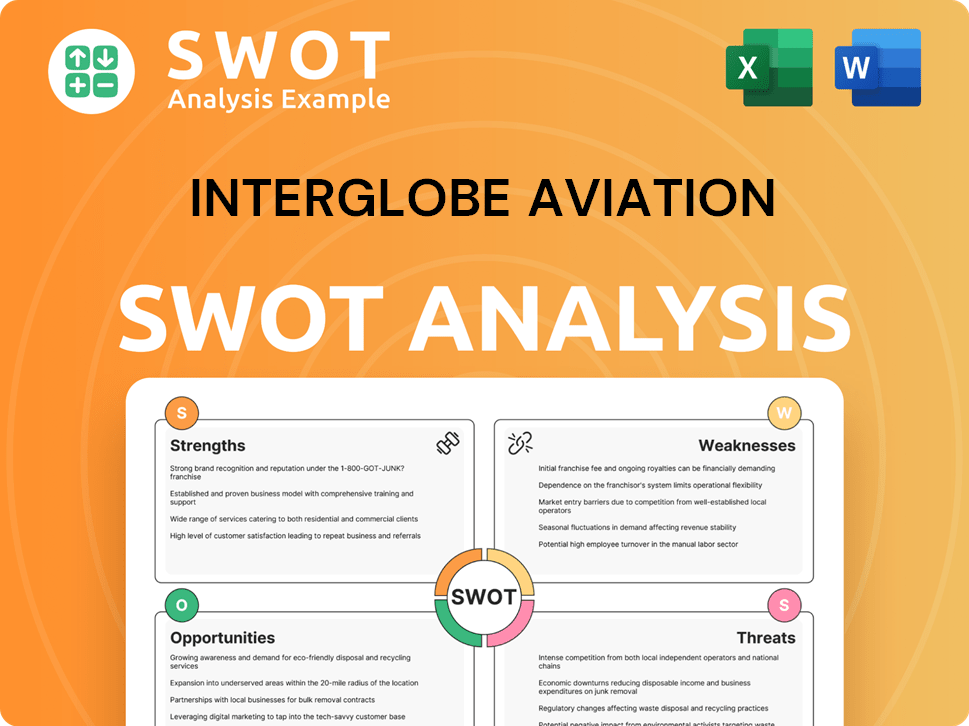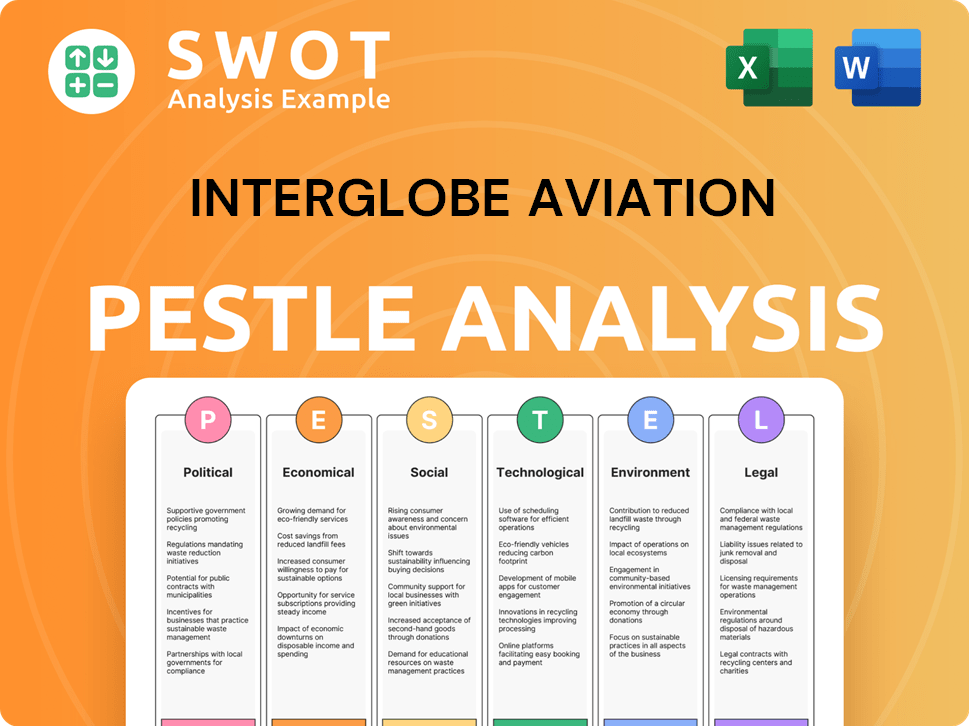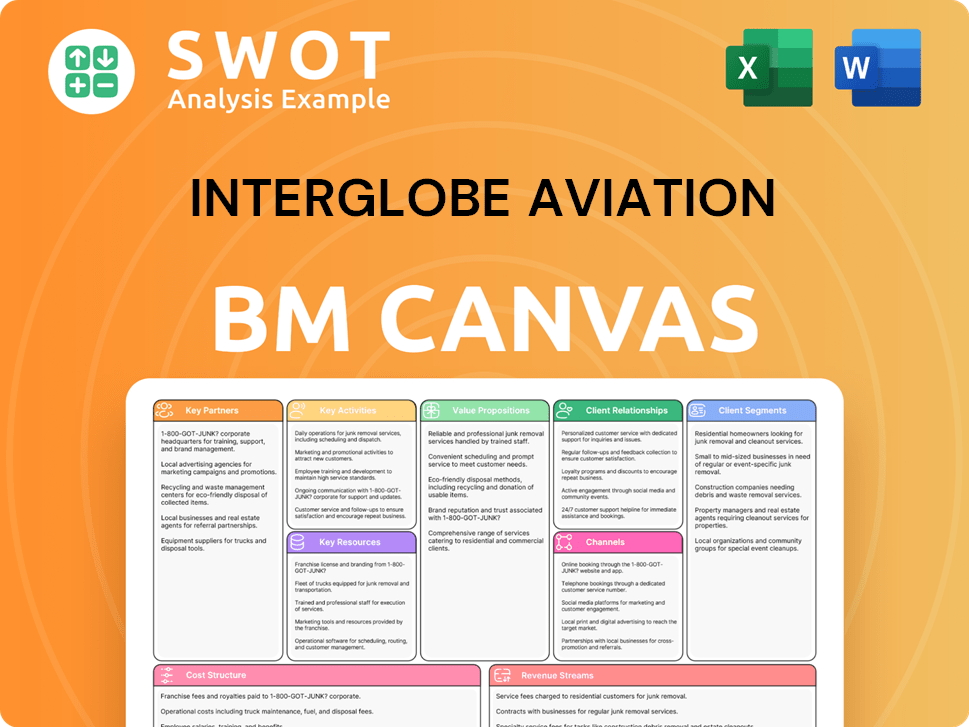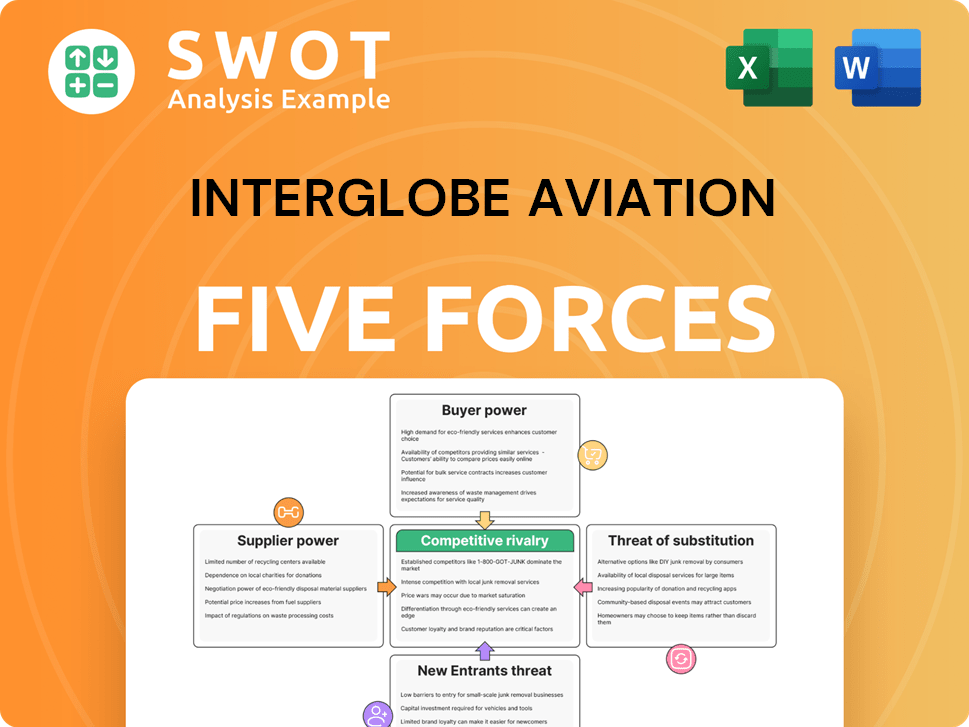InterGlobe Aviation Bundle
Who Flies with IndiGo? Unveiling InterGlobe Aviation's Customer Base
In the dynamic world of aviation, understanding the InterGlobe Aviation SWOT Analysis is crucial for success. With domestic air traffic soaring by 11.28% in January 2025, reaching 1.46 crore passengers, IndiGo, a subsidiary of InterGlobe Aviation, must deeply understand its customer demographics and target market. This knowledge is key to maintaining its market leadership and navigating the evolving aviation landscape.

Founded in 2005, IndiGo quickly became a dominant force in the aviation industry, initially focusing on the price-sensitive domestic traveler. As of April 2025, IndiGo's impressive 64.1% domestic market share and its expansion into international routes highlight the need for a detailed examination of its customer profile. This analysis will explore market segmentation strategies, Indigo Airlines customer age range, income levels, geographic reach, and passenger behavior to understand who are Indigo Airlines' main customers.
Who Are InterGlobe Aviation’s Main Customers?
Understanding the customer demographics and target market is crucial for assessing the success of any airline. For InterGlobe Aviation, also known as IndiGo, the primary focus has historically been on the consumer market (B2C). This strategy has allowed it to capture a significant portion of the rapidly expanding Indian middle-class population, who seek affordable and reliable air travel options.
IndiGo's core customer profile has traditionally centered on price-sensitive travelers. This includes both business and leisure passengers who prioritize on-time performance and a hassle-free travel experience. The airline's operational efficiency, supported by a standardized fleet of Airbus A320 family aircraft, enables it to offer competitive fares. This has been a key factor in its impressive market share growth.
As of January 2025, IndiGo achieved a record-breaking domestic market share of 65.2%. In Q4 FY25, the airline transported 27.77 million passengers, holding a dominant market share of 64.3%. This is a notable increase from the 60.3% market share and 23.59 million passengers in the same quarter the previous year. Furthermore, IndiGo carried 118 million passengers in FY25, showcasing its continued strong performance within its primary customer segment.
The primary customer demographics for IndiGo include a broad spectrum of travelers, but primarily focus on the growing Indian middle class. These customers are typically price-conscious, valuing affordability and efficiency. They are often business travelers and leisure passengers who prioritize punctuality and a seamless travel experience.
IndiGo's target market is primarily India's domestic air travel sector, with a focus on cost-conscious consumers. The airline has successfully targeted both business and leisure travelers. As IndiGo expands its international routes, it is also targeting business travelers and tourists who seek a balance of affordability and comfort.
IndiGo's market segmentation strategy has primarily focused on the price-sensitive segment of the aviation market. This includes segmenting customers based on their willingness to pay for additional services. The airline's expansion into international routes with new aircraft and dual-class configurations represents a shift towards serving segments that value comfort and amenities.
IndiGo is evolving its target market by expanding into long-haul international operations. With plans to introduce 69 Airbus A321XLR aircraft by late 2025 and 30 Airbus A350-900 aircraft starting in 2027, IndiGo aims to capture business travelers and tourists on international routes. This strategic move reflects the airline's desire to diversify revenue streams.
IndiGo is broadening its reach by entering the long-haul international market. This expansion is driven by market maturity in domestic aviation and a desire to diversify revenue streams. This strategy involves introducing new aircraft with dual-class configurations, including business class, to attract a wider range of passengers.
- The airline is planning to induct 69 Airbus A321XLR aircraft by late 2025.
- An additional 30 Airbus A350-900 aircraft will be introduced starting in 2027.
- This expansion aims to capture business travelers and tourists on international routes.
- This strategic shift is detailed further in Revenue Streams & Business Model of InterGlobe Aviation.
InterGlobe Aviation SWOT Analysis
- Complete SWOT Breakdown
- Fully Customizable
- Editable in Excel & Word
- Professional Formatting
- Investor-Ready Format

What Do InterGlobe Aviation’s Customers Want?
Understanding the customer needs and preferences is crucial for the success of any airline. For InterGlobe Aviation, also known as IndiGo, this involves a deep dive into what drives their passengers' choices and how the airline can best meet those needs. IndiGo's approach focuses on providing affordable, reliable, and convenient air travel experiences.
The primary drivers for IndiGo customers include competitive pricing, punctuality, and a hassle-free travel experience. These factors influence purchasing decisions, with a strong emphasis on value for money. IndiGo's operational efficiency and focus on customer satisfaction are key to retaining and attracting passengers.
IndiGo's success is built on understanding and catering to these core needs. By consistently delivering on-time performance and offering user-friendly services, IndiGo aims to build lasting customer loyalty and maintain its position in the aviation industry.
Pricing is a key factor influencing customer decisions. IndiGo's strategy of offering competitive fares has been central to its market dominance. This approach attracts a broad customer base looking for value.
Reliability is a major priority for passengers. IndiGo's focus on maintaining high on-time performance builds trust. In January 2025, IndiGo achieved an on-time performance of 75.5%, highlighting its commitment to this aspect.
Customer experience is enhanced through user-friendly services. IndiGo provides a seamless booking process via its website and mobile app. This includes easy online check-ins and reservation management.
IndiGo's loyalty programs reward frequent flyers. The IndiGo BluChip program, launched in November 2024, had already enrolled over 2 million members within six months. This offers benefits and encourages repeat business.
IndiGo continuously expands its service offerings. The partnership with Vernost Marketing Services Private Limited in June 2024 introduced hotel booking options. This provides customers with comprehensive travel planning tools.
Catering to different customer segments is a key strategy. The introduction of a dual-class configuration with business class seats on the A321XLR aircraft, expected in mid-2025, aims to attract premium travelers while maintaining competitive pricing.
IndiGo's strategies are designed to meet diverse customer needs. By focusing on affordability, reliability, and convenience, the airline aims to maintain customer satisfaction and loyalty. The introduction of new services and loyalty programs further enhances the overall travel experience. For a deeper dive into the company's financial performance and strategic initiatives, you can refer to a detailed analysis of InterGlobe Aviation's Q4 results.
IndiGo's customer base prioritizes several key factors when choosing air travel. These preferences shape the airline's operational and strategic decisions.
- Affordability: Competitive pricing is a primary driver for attracting customers.
- On-Time Performance: Reliability and punctuality are crucial for customer satisfaction.
- Convenience: User-friendly booking processes and services enhance the travel experience.
- Loyalty Benefits: Programs like IndiGo BluChip reward frequent flyers and encourage repeat business.
- Expanded Services: Offering additional services like hotel bookings streamlines travel planning.
InterGlobe Aviation PESTLE Analysis
- Covers All 6 PESTLE Categories
- No Research Needed – Save Hours of Work
- Built by Experts, Trusted by Consultants
- Instant Download, Ready to Use
- 100% Editable, Fully Customizable

Where does InterGlobe Aviation operate?
The geographical market presence of InterGlobe Aviation, operating as IndiGo, is primarily defined by its strong foothold in the Indian domestic aviation sector. As of April 2025, the airline holds a substantial 64.1% market share within India, solidifying its position as the leading carrier in the country. This dominance is supported by an extensive network and a large fleet, catering to a broad customer base across various demographics.
IndiGo's domestic network comprises over 2,200 daily flights to 91 destinations within India. This extensive coverage connects major cities and regional hubs, facilitating both business and leisure travel. The airline's strategic focus on expanding its route network has been a key factor in its continued growth and market leadership. The airline's market share in January 2025 was 65.2%, increasing from 64.4% in December 2024. In February 2025, its domestic market share was 63.7%, carrying 89.40 lakh passengers.
Beyond India, IndiGo is actively expanding its international operations to capture a larger share of the global aviation market. IndiGo's expansion strategy includes targeting underpenetrated markets and strengthening its presence in key regions.
IndiGo's domestic market share reached 64.1% by April 2025, with over 2,200 daily flights. This extensive network connects 91 domestic destinations, making it the leading carrier in India.
IndiGo operates flights to 34 international destinations and is expanding into Central Asia, Europe, and Africa. New routes to Tashkent, Amsterdam, and Manchester are planned to increase international capacity.
Codeshare agreements with airlines like Air France-KLM and Delta enhance network depth. These partnerships extend customer access across Europe and North America, improving the airline's global reach.
The induction of Airbus A321XLR aircraft will enable nonstop flights to distant cities. IndiGo aims to increase its international capacity share from 28% to 40% by fiscal year 2030.
IndiGo is expanding into Central Asia, with new flights from Mumbai to Tashkent starting August 2025. This expansion is driven by growing trade and tourism ties between India and Uzbekistan.
Direct flights to Amsterdam and Manchester are set to commence in July 2025. The airline is also exploring additional European destinations like Athens and Rome.
IndiGo uses a multi-hub model with Delhi focusing on Central Asia, Mumbai on West Asia, and Hyderabad on niche markets. This approach reduces congestion and streamlines operations.
IndiGo plans to induct 69 Airbus A321XLR aircraft by late 2025. This will enable nonstop flights to distant cities, expanding its long-haul capabilities.
Strategic partnerships, such as codeshare agreements with Air France-KLM and Delta Air Lines, enhance network depth. These agreements improve customer access across Europe and North America.
IndiGo’s domestic market share was 65.2% in January 2025, increasing from 64.4% in December 2024. This demonstrates the airline's continued growth and dominance in the Indian market.
IndiGo's expansion strategy is influenced by factors such as market demand and strategic partnerships. This approach is designed to enhance its global reach and customer access.
- The airline aims to increase its international capacity share from 28% to 40% by fiscal year 2030.
- The multi-hub model, with Delhi, Mumbai, and Hyderabad, is used to reduce congestion and streamline operations.
- Codeshare agreements with major airlines enhance network depth and customer access.
- The expansion into Central Asia is driven by growing trade and tourism ties. For more information, you can read a Brief History of InterGlobe Aviation.
InterGlobe Aviation Business Model Canvas
- Complete 9-Block Business Model Canvas
- Effortlessly Communicate Your Business Strategy
- Investor-Ready BMC Format
- 100% Editable and Customizable
- Clear and Structured Layout

How Does InterGlobe Aviation Win & Keep Customers?
The customer acquisition and retention strategies of InterGlobe Aviation, also known as IndiGo, are centered around providing affordable fares, operational efficiency, and on-time performance. This approach is designed to resonate with its target market by offering a hassle-free travel experience. The airline leverages various channels to attract and retain customers within the competitive aviation industry.
IndiGo's strategy focuses on maintaining its position as a leading airline by continually enhancing customer experience and expanding its network. The airline's commitment to punctuality and its recently launched loyalty program play a significant role in retaining customers. These initiatives, along with strategic partnerships and investments in new aircraft, highlight IndiGo's dedication to fostering customer loyalty and increasing customer lifetime value.
By focusing on these strategies, IndiGo aims to maintain its market leadership and attract new customers while enhancing the overall travel experience. The airline's approach is data-driven, using information on customer demographics and preferences to refine its offerings and ensure it meets the evolving needs of its target market.
IndiGo utilizes its website and mobile app for seamless flight booking and management, making it a primary channel for customer acquisition. Digital platforms are key components of their marketing strategy, allowing for targeted advertising and direct engagement with potential customers. These platforms provide easy access to information and services, enhancing the overall customer experience and driving sales.
With the widest domestic network in India, IndiGo offers unparalleled connectivity, which is a significant tool for acquiring customers. Expanding its network to 88 destinations in 2024 has increased accessibility for a wider customer base. This extensive reach allows IndiGo to capture a larger share of the market by providing convenient travel options.
Launched in November 2024, the IndiGo BluChip program is a key customer retention tool, attracting over 2 million members in just six months. Members earn and redeem BluChips on flights and access exclusive discounts on add-ons, encouraging repeat business. This program enhances customer loyalty by rewarding frequent flyers and providing added value.
IndiGo is exploring strategic partnerships, such as the planned collaboration with Accor, to expand its loyalty program benefits. These partnerships allow members to earn and redeem points across flights, stays, and experiences, enhancing the value proposition. Such collaborations will help IndiGo retain customers and attract new ones through expanded offerings.
IndiGo's customer-centric approach is evident in its continuous efforts to improve the overall travel experience. This includes digital enhancements and fleet modernization, which are crucial for attracting and retaining customers. By focusing on these aspects, IndiGo ensures it remains competitive and meets the evolving needs of its target market. For more insights, you can explore the Competitors Landscape of InterGlobe Aviation.
IndiGo partners with companies like Vernost Marketing Services to integrate services like hotel booking, streamlining travel planning. This focus on digitization enhances the customer experience by offering convenience and ease of use. These partnerships reflect IndiGo's commitment to providing a seamless travel ecosystem.
Investing in new aircraft, including 69 Airbus A321XLRs by late 2025 and 30 Airbus A350-900s from 2027, enhances the customer experience. The new aircraft will offer a dual-class configuration with business class seats, improving comfort and service. These investments are crucial for long-haul international travel.
IndiGo focuses on improving the overall travel experience to foster customer loyalty and increase lifetime value. The airline's efforts in digitization and fleet modernization are designed to meet the evolving needs of its passengers. By prioritizing customer satisfaction, IndiGo aims to strengthen its market position.
IndiGo's reputation for operational efficiency and on-time performance is a key factor in customer acquisition and retention. The airline's ability to provide a reliable service builds trust and encourages repeat business. This focus on efficiency supports IndiGo's value proposition.
InterGlobe Aviation Porter's Five Forces Analysis
- Covers All 5 Competitive Forces in Detail
- Structured for Consultants, Students, and Founders
- 100% Editable in Microsoft Word & Excel
- Instant Digital Download – Use Immediately
- Compatible with Mac & PC – Fully Unlocked

Related Blogs
- What are Mission Vision & Core Values of InterGlobe Aviation Company?
- What is Competitive Landscape of InterGlobe Aviation Company?
- What is Growth Strategy and Future Prospects of InterGlobe Aviation Company?
- How Does InterGlobe Aviation Company Work?
- What is Sales and Marketing Strategy of InterGlobe Aviation Company?
- What is Brief History of InterGlobe Aviation Company?
- Who Owns InterGlobe Aviation Company?
Disclaimer
All information, articles, and product details provided on this website are for general informational and educational purposes only. We do not claim any ownership over, nor do we intend to infringe upon, any trademarks, copyrights, logos, brand names, or other intellectual property mentioned or depicted on this site. Such intellectual property remains the property of its respective owners, and any references here are made solely for identification or informational purposes, without implying any affiliation, endorsement, or partnership.
We make no representations or warranties, express or implied, regarding the accuracy, completeness, or suitability of any content or products presented. Nothing on this website should be construed as legal, tax, investment, financial, medical, or other professional advice. In addition, no part of this site—including articles or product references—constitutes a solicitation, recommendation, endorsement, advertisement, or offer to buy or sell any securities, franchises, or other financial instruments, particularly in jurisdictions where such activity would be unlawful.
All content is of a general nature and may not address the specific circumstances of any individual or entity. It is not a substitute for professional advice or services. Any actions you take based on the information provided here are strictly at your own risk. You accept full responsibility for any decisions or outcomes arising from your use of this website and agree to release us from any liability in connection with your use of, or reliance upon, the content or products found herein.